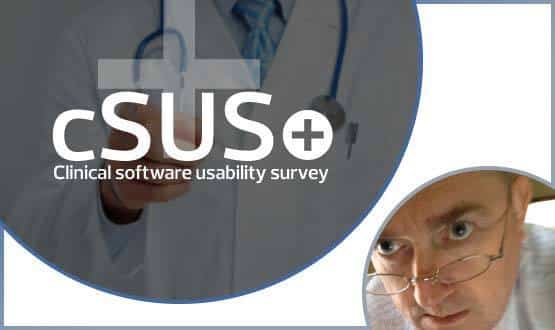Joe’s view: of the clinical software usability survey
- 1 December 2015

Michael Young was an advocate of Ghandi’s approach to change management: “Be the change you wish to see in the world.”
Michael Young was born in Australia but a glittering career as a serial social entrepreneur saw him elevated to the House of Lords as Lord Young of Dartington.
On his death in 2002 his son, the writer Toby Young wrote warmly of his father’s love of tomato soup and the deep-seated insecurity that drove him to continuously seek improvement in the world around him.
His career credits include writing the 1945 Labour Party manifesto, the establishment of the Open University, and the establishment of The Consumer Association. The latter would go on to see consumer rights enshrined in the Sale of Goods Act and the establishment of ‘Which?’ magazine.
For £10.75 a month, subscribers are able to read warts and all reviews of all kinds of products, from cars to computers, banks to batteries.
Members can also write reviews of what they have purchased and share their views with the wider membership. I’m sure it’s rise was initially regarded with suspicion by manufacturers, but Wise firms now subscribe.
Indeed, in a most interesting development, the car company Kia recently embarked on an initiative that allowed customers to publish unedited reviews of its vehicles on the American product review site, ‘revoo’.
This allows Kia to boast as follows: “Unedited, uncensored feedback means everything to us, so we've partnered with reevoo, the respected independent review company, who collect, collate and publish all your reviews – without any intervention from us! How well did we do? Let’s just say that after more than 13,000 reviews, over 97% would choose Kia again.”
Which? EPR
This isn’t exactly the attitude that we have encountered in the UK electronic health records market. Where end-users have had a real choice of systems – in general practice and for digital imaging – competition has driven improving functionality and usability.
But in secondary care – where the National Programme for IT gave end-users had little or no say in the software they would have to use for years to come – competition has been stifled.
The end of the programme means many organisations are now looking to procure systems to meet shifting ‘paperless by’ targets. But there is no Which? magazine for EPRs: there is nowhere to read unedited reviews of systems and suppliers.
This problem first struck me when I was National Clinical Lead for IT. Anticipating my ejection from the programme, I bought the domain name
in the hope that I might be able to establish an online comparison website for EPRs.
After all, patients can go online and rate me
anonymously nowadays, so why shouldn’t EPR users have the same rights to talk about their software?
Unfortunately, my plans were scotched by legal advice that my pockets weren’t deep enough to defend any legal action that might follow my publication of unedited reviews. Project abandoned.
Mental health has shown the way
Two years ago, my colleagues in the National Mental Health Informatics Network were emboldened by our strength in numbers.
We carried out the first ever National Survey of Usability of Mental Health EPRs and presented the results to the burgeoning CCIO Leaders Network.
The project showed that such a survey could be carried out and that there was a large gap in the market for an EPR with the kind of usability scores you would expect in the world of consumer software.
It also revealed wide variations in the usability scores of the same system in different trusts; perhaps shining a light on poor implementation or outdated hardware or imperfect clinical engagement.
Some argue the fact that the same system can achieve different scores in different settings means that such surveys are not useful (“rating the food on a self catering holiday”)
But this doesn’t matter to the end user. If the system scores 30% for a group of end users in trust A, that needs to be highlighted. And if trust B scores 80% with the same EPR, then it should be able to help its colleagues over in trust A to identify how to improve matters.
Fill in cSUS; start to change the healthcare IT world
That is where the CCIO Network’s new, clinical systems usability survey, or cSUS, comes in
We share our successes and failures in pursuit of excellence in health IT to avoid repeating the mistakes of the past. We work closely with system suppliers to try to make things better.
When we announced a national usability survey at EHI Live 2015, we knew there would be nervousness in the supplier community and in some NHS trust IT departments. Were manufacturers keen on Which? at the outset? Were hoteliers keen on TripAdvisor? Were doctors keen on iWantGreatCare?
Hold your nerve. Embrace the survey. It’s just a pilot at this stage. It will work best if as many organisations as possible join in and if as many people within those organisations do the same.
If a trust has the courage to send the survey to all EPR users they will get the most out of the exercise. If a there is a system supplier confident enough to send it to all users, step forward and claim the moral high ground.
Make no mistake, the CCIO Network wants to see a genuinely open market place in EPRs with transparency on usability and price.
Imagine a supplier willing to publish unedited reviews. Imagine reading the relative usability scores of systems ranked against their cost per user per year. Imagine yourself changing the world.
Take the survey, share the survey, persuade your employer to share it widely, persuade your system supplier to embrace the survey. Imagine what you can achieve. Be the change you wish to see in your world.

 |
Joe McDonaldJoe McDonald is a practising NHS consultant psychiatrist. Over the past five years he has been an NHS trust medical director and national clinical lead for IT at NHS Connecting for Health – a stint that included 18 months as medical director of the Lorenzo delivery team! His experiences in the National Programme for IT in the NHS have left him with a passion for usability and "end user knowledge networks.” He is the founding chairman of the National Mental Health Informatics Network. Motto: we don't get fooled again. Follow him on twitter @CompareSoftware |
 |




